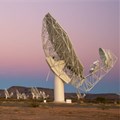
Minister of Science and Innovation, Prof Blade Nzimande, gave the opening keynote for the first IAU general assembly on in Africa.
"Our slogan from the time we first proposed this event to be held here has been 'It’s Time for Africa, Ke Nako'," he stated, expressing hope that the conference would highlight Africa's contributions to global astronomy and its potential for future advancements.
Reflecting on the rich history of African astronomy, Nzimande highlighted the ancient and sophisticated knowledge systems of various African cultures.
He referenced ancient Egyptians' development of the world’s first 12-month, 365-day calendar and the Dogon people of Mali's understanding of the Sirius star system.
"These advances in early African knowledge of celestial systems and forces were closely tied to the survival and evolutionary history of those Africans," he explained.
"Two major international telescopes were set up in South Africa during the democratic era," he noted, referencing the Southern African Large Telescope (SALT) and the MeerKAT telescope, a precursor to the Square Kilometre Array (SKA) project.
New PhD programme
Nzimande used the occasion to announce the launch of a new Presidential PhD programme aimed at developing critical skills in various scientific fields, including astronomy.
"I hope that astronomy and space science will benefit from this initiative given the truly internationalist and multi-disciplinary nature of these fields," he said.
In line with the National Strategy for Multiwavelength Astronomy of 2015, South Africa aims to become a global hub for astronomical sciences.
The MeerKAT/SKA project as a key component of this vision, offering opportunities to contribute to the knowledge economy and the big data revolution through international collaborations.
"We are also working closely with the Department of Tourism to develop the astro-tourism sector through community-public-private partnerships," he added.
This initiative includes the upcoming Annual World Tourism Day in Carnarvon, which will promote the preservation of dark skies and radio silence essential for stargazing and astrotourism.
Public engagement
A notable feature of this year's assembly is its emphasis on inclusivity and public engagement.
"We have a duty to explain the link between cosmic origins and the human story," said Nzimande.
The event includes Open Access features online, volunteer opportunities for young people, and public talks by renowned African American women astronauts Dr Sian Proctor and Dr Mae Jemison.
In celebrating Women’s Month, the assembly also hosts joint sessions between the International Astronomical Union Women in Astronomy (IAU WiA) and the African Network of Women in Astronomy (AfNWA).
"This session aims to facilitate discussions among astronomers on gender balance issues and policies supporting the careers of women researchers," Nzimande explained.
Advancing research
The minister expressed gratitude to the IAU for entrusting South Africa with hosting this prestigious gathering and to all teams involved in its organisation.
"This gathering reflects the global astronomy community's commitment to advancing research, fostering collaboration, and addressing contemporary challenges in astronomy and those faced by humanity," he concluded.
As the 2024 International Astronomical Union General Assembly unfolds, it promises to be a landmark event, showcasing Africa's growing prominence in the field of astronomy and fostering international scientific cooperation.

















































